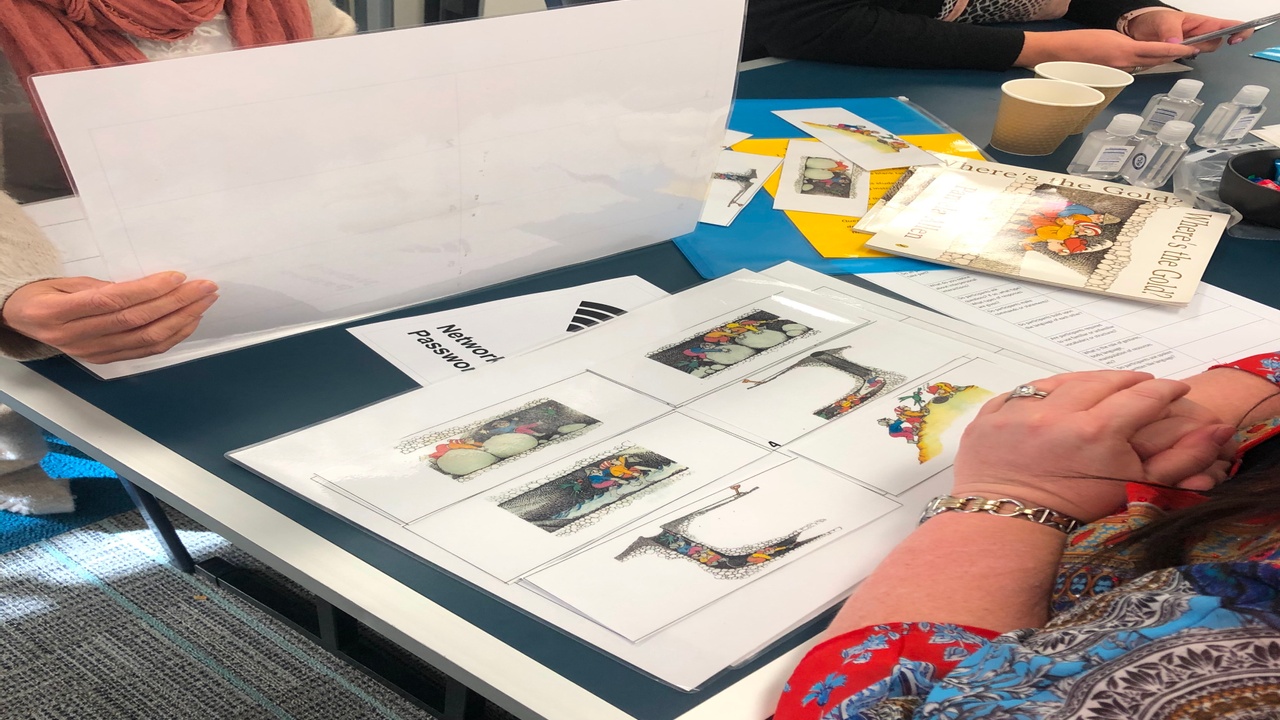Teaching grammar: What does it look and sound like?

In thinking about the look and sound of grammar in classrooms, the key word is meaning. For some, grammar can be viewed as threatening and onerous, even boring, but it can just as easily be a wonderful tool to support conversations about how we can decide to make meaning in various modes. It is the talk about language, that can be engaging and empowering for both teachers and students (Myhill, 2021 and Rossbridge & Rushton, 2015). In working with time poor teachers, I often think about where to start with professional learning about grammar. The first place to start is with context and how the context and purpose impacts upon language features selected by a speaker, writer, designer, artist etc.
By exploring real-world examples like recipes, stories, advertisements, or social media posts, students can see how grammar functions differently depending on the situation. Take a recipe, for instance. The way ingredients and instructions are structured reflects not only the process of cook...
Test preparation or curriculum implementation: Persuasive writing to value student voice

As the new school year begins and teachers are faced with NAPLAN occurring earlier than in previous years, we start to play the guessing game of what type of text students will be required to write. The bets on persuasive or imaginative writing have already started!
Carter (2017) discusses how ‘attention is effectively diverted from curriculum implementation’ through the emphasis on systemic testing. If your bets are on a particular type of writing, it is easy to succumb to the pressure, however, it is also a chance to embrace and use the situation to not only prepare for the test but more importantly focus on rich, engaging curriculum implementation by embedding your writing focus into not only English but also other subject area units.
As with any focus on writing, the most important aspect when planning is to consider the context for writing. The more authentic and meaningful, the better for engaging students. Who would want to write a persuasive text if there is no one to persuad...
Have you responded to the Draft NSW English 3-6 Syllabus?

The draft of the NSW English 3-6 Syllabus is now available for consultation, however, responses are due by 2 May so there are only a few days remaining to have your voice heard. It is crucial that as many people respond as possible. Since the K-2 Syllabus, the 3-6 draft has been released with the English 7-10 Syllabus which is also available for consultation.
Development of the 3-6 English Syllabus was due to the NSW Curriculum Review (2020). As a result government priorities from the review include aspects such as developing increasing depth over time whilst also removing content considered more peripheral. When responding to the draft it is important to look through this lens and note the absence of important content relevant to this century and think about the depth and continuity across not only 3-6 but K-10.
To get you started Kathy Rushton and I have compiled a response. You are very welcome to read our thoughts and use any comments if you find them useful when forming your ow...
Selecting and using picture books for Anzac Day

How can we use picture books connected to Anzac Day?
Anzac Day is a uniquely Australian (and New Zealand) commemoration of those who lost their lives in military and peacekeeping operations in which Australia has been involved. We have a rich range of literature to assist children with understanding its origins, significance and evolution over time. Great literature on the topic ranges from novels for older students to an incredible range of picture books written by some of Australia’s greatest authors and illustrators with a child audience in mind.
A topic like war can be seen as confronting for children but literature is an effective way to introduce and discuss aspects and events which, unfortunately, are evident not only part of our history but current context. Picture books are commonly shared around the time of Anzac Day each year, but there is much potential to work with these rich texts beyond just shared reading.
Many well-known Anzac Day picture books can be considered fic...
Motivating students to write poetry: Magnetic Poetry

Need ideas for engaging students to compose poetry?
Do you remember when magnetic poetry was the craze? You’d visit a friend or relative and they would have magnetic words all over their refrigerator door which would be carefully arranged into poetry based on their feelings across the day or week. I wonder what happened to all those magnetic words?
Thankfully, you can still buy magnetic letter kits or alternatively make your own as well as a range of other options which I’ll outline below. The key consideration should be how we can use such resources in pedagogically sound ways to get students excited about writing poetry whilst also providing appropriate support. The benefit of using magnetic poetry is that it supports students to not only compose their own poetry but also provides the vocabulary which can sometimes be a stumbling block for getting started.
Dave Kapell, created Magnetic Poetry in the 1990s, when experiencing writer's block while trying to compose song lyrics. Fo...
Top 7 Ways to Pamper with Poetry

Sharing to Pamper with Poetry
As all students and teachers will have returned to classrooms in New South Wales today, poetry can be an option for ensuring both students and teachers are pampered as they re-engage in classrooms and with each other. In fact, poetry can be used to pamper anyone at any time, particularly in times of uncertainty and even trauma.
Across the week, multiple poems can be shared for sheer joy and reflection. I have put together my Top 7 collections and individual poems for sharing as students embrace the school environment, reflect on remote learning and share their hopes for the future. All poems are available online and can be shared with a range of age groups. As with any text, it is important to read the poems several times to ensure they are appropriate for your school and context before sharing with students.
1. Round and Round by John Kitching is a joyful poem to celebrate the joy of interacting in the school setting particularly social aspects that h...
English K-2 Syllabus Draft 2 Feedback
Have you provided feedback on the second draft of the NSW English K-2 Syllabus?
The second draft of the English K-2 Syllabus is now available for consultation, however, responses are due by 23 August. It has been a very tight turn around period especially considering the Covid situation in NSW and the pressures on educators. Despite this, it is crucial that as many people respond as possible. The aim is to have this syllabus implemented next year. Although the second draft is an improvement on the first draft, there are still areas of concern.
To get you started Kathy Rushton and I have compiled a response. Please feel free to use any of the points to submit your own feedback to NESA.
The feedback form can be found on the NESA site.
Maintaining the Integrity of Teaching and Learning Programs in these Covid Times

How do I ensure my online teaching has key elements of effective pedagogy?
After talking to several teachers in recent weeks, I’ve been thinking about how the integrity of existing or designed teaching and learning programs can be maintained and transferred to the online learning environment as we learn to live in lockdowns. Effective teaching will always be effective teaching, but I guess it’s about unpacking elements of effective teaching and then thinking about how adjustments to pedagogy can ensure effective teaching occurs regardless of the mode.
To reflect on what constitutes effective teaching, we have numerous sources that outline what this looks like. In the past 20 years teachers have been given a myriad of tools and frameworks for reflecting on and designing learning. This has included the Quality Teaching Framework in NSW (Department of Education, 2008) and Productive Pedagogies in Queensland (Education Queensland, 2002) in the early-mid 2000s. More recently we have had ...
Australian Curriculum Review Consultation

Why should you provide feedback on the Australian Curriculum Review Consultation?
Time is running out to provide feedback on the Australian Curriculum Review with the closing date of 8 July fast approaching. Feedback is being sought on Learning Areas, General capabilities and Cross-curriculum priorities. You can find the survey and a range of resources to support your response on the Australian Curriculum Review page.
As many states have adapted the Australian Curriculum or developed their own syllabus documents, we may think responding to the Australian Curriculum review is not a priority, especially given how time poor teachers are currently. However, the Australian Curriculum 'outlines the core knowledge and skills to be taught to students from Foundation to Year 10, wherever they live in Australia' ACARA, 2021. This is worth remembering. Of key importance, is the development and refinement of state documents currently and the need to ensure they continue to align with the Austra...
Tell Me Your Story Oral Language Focus

Reflection on Oral Language Strategies
Kathy Rushton and I have just completed Day 1 of the Tell Me Your Story course run through the NSW Teachers Federation Centre for Professional Learning. This was the first day of the three day course where we focused on speaking and listening by considering principles of second language learning as well as the mode continuum.
We looked at the role of the mode continuum (Derewianka, 2014 & Martin, 1985) and how spoken and written like language differ particularly in terms of lexical density. We then considered how choice and sequence of oral language activities supports not only the literacy of students but also builds their confidence and language. Careful design of oral language activities also values cultural identity and their identity as learners (Dutton, D'warte, Rossbridge, & Rushton, 2018).
All activities were done by the teachers in the course as they thought about the language demands and how they could meaningfully contextualise strat...
